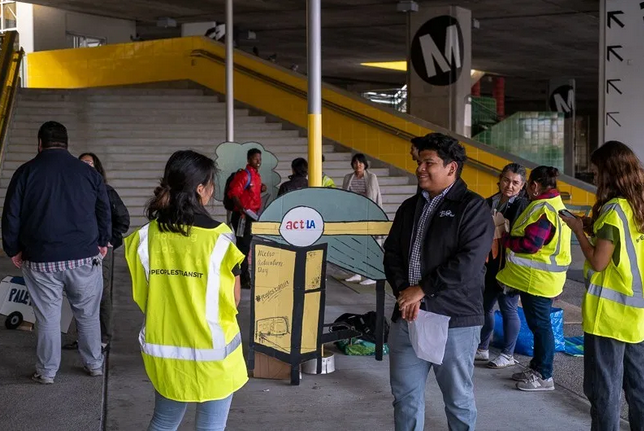Today, the Metro board of directors approved four motions that get the agency started on reimagining transit policing. None of the motions directly re-allocate police resources, but they do set up a process for implementing some reallocation as Metro's ~$130 million per year multi-agency law enforcement contract approaches renewal in 2022.
Advocates, primarily organized by the Alliance for Community Transit (ACT-LA), overwhelmed Metro's remote meeting public comments system, with more than sixty commenters all weighing in in favor of the strongest proposal.
The Metro board is somewhat split on law enforcement issues.
The outgoing board chair, Inglewood mayor James Butts - a former police chief - today frequently peppered his comments with praise for police, including asserting they are "just, fair, considerate, and compassionate" and that their response is "99.9 percent patience, courtesy, and compassion." Butts concedes that police are "doing things they weren't trained for" and that there are "some idiots out there." Butts emphasized a need for leadership - from electeds and in law enforcement agencies - to articulate a clear mission that sets law enforcement culture, and to hold law enforcement accountable.
At the other end of the spectrum is Los Angeles City Councilmember Mike Bonin, the author of the primary reenvisioning motion. Bonin has been a longstanding key Metro voice in support of equity issues, consistently and strongly supporting transit riders and improved bus service. Today, Bonin made the case that Metro policing shifts must center and elevate the voices and concerns of "core riders" consisting primarily of low income, Black, Latinx, and women.
Specifics on the four motions below.
Item 35 - Metro use of force policy - by boardmembers Janice Hahn, Hilda Solis, and James Butts
- Motion mandates Metro report to the board in ninety days with a review of the transit police training and use of force policies, including recommendations for reform and for reallocating resources to homelessness outreach and services.
Today Hahn stated that "she has nothing against police" but wants to "take away from the burdens we've given hard-working law enforcement." The Hahn motion is the less ambitious of two somewhat overlapping core policing motions. It is more reform-minded, less wholesale reenvisioning, though it does call for some future recommendations on some reallocation of resources away from police. The motion passed unanimously.
Item 37 - Community safety approach to system security and law enforcement - by boardmembers Mike Bonin, Eric Garcetti, Hahn, Dupont-Walker, and Solis
- Motion establishes a Transit Public Safety Advisory Committee which will develop a community-based approach to public safety on the transit system, including shifting resources away from armed law enforcement toward alternatives including transit ambassador program and outreach to the unhoused. Starting in ninety days, the committee will report back quarterly through the 2022 Metro law enforcement contract renewal.
This Bonin motion is the strongest reimagining supported by advocates. It was approved on a 9-2 vote, with directors Kathryn Barger and Ara Najarian against. Several directors said that perhaps another committee wasn't necessary, and could be delayed until the Hahn motion report-back was received. Bonin held firm, insisting on forming a focused committee right now.
Item 38 - Bonin motion on mutual aid agreement - by boardmembers Bonin, Solis, and Garcetti
- Motion directs Metro to review its commitments under the mutual aid agreement and seek amendments, if necessary, to ensure that Metro assets are only required for civilian transportation purposes, with a report back in ninety days.
Metro was criticized for turning buses over to LAPD to transport detained protestors in late May and early June. Metro responded to criticisms stating that the agency was "required by law" to provide buses to the police due to mutual aid agreements, which are designed to facilitate resource sharing during emergencies. Bonin has correctly noted that detainees were largely apprehended for exercising their right to free speech. Police released the overwhelming majority of detainees with no charges.
This motion passed unanimously.
Item 39 - Policies and protocols for future service shutdowns - by boardmembers Bonin and Solis
- Motion directs Metro to develop clear criteria for suspending service, including protocols for rider notification
On May 30, in response to Black Lives Matter protests, Metro suspended transit service countywide, stranding riders. Today, CEO Phil Washington delivered a presentation on "Metro’s actions in response to demonstrations and civil unrest during the weekend of May 30, 2020," which revealed some new information, but did not shed light on how the decision to suspend service took place.
This motion passed unanimously.






